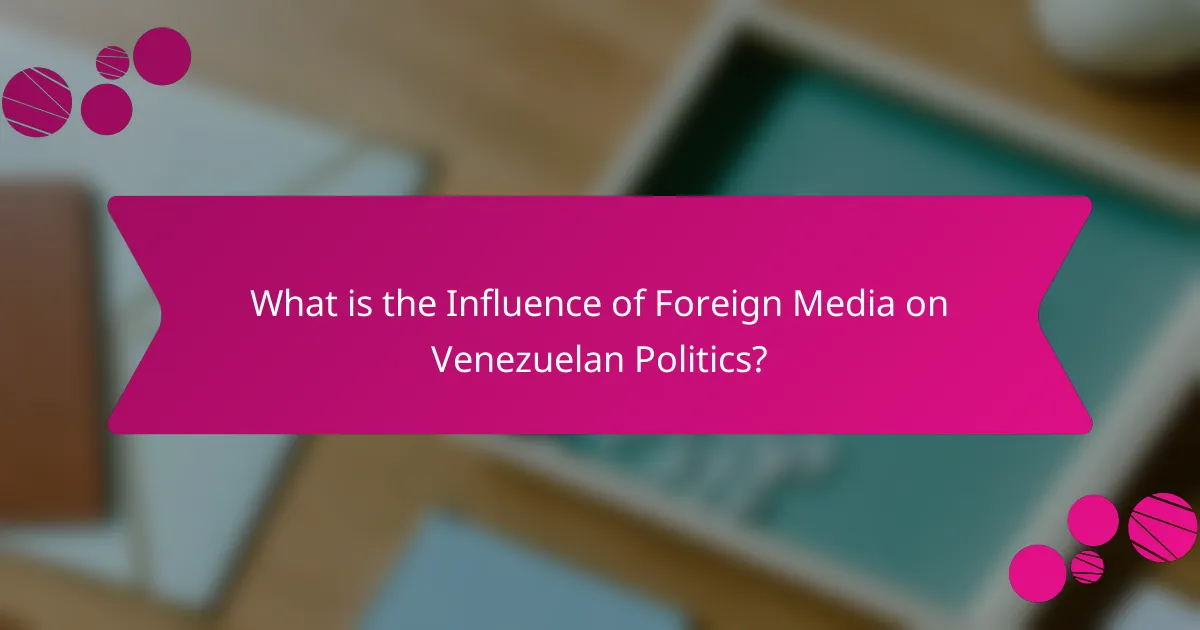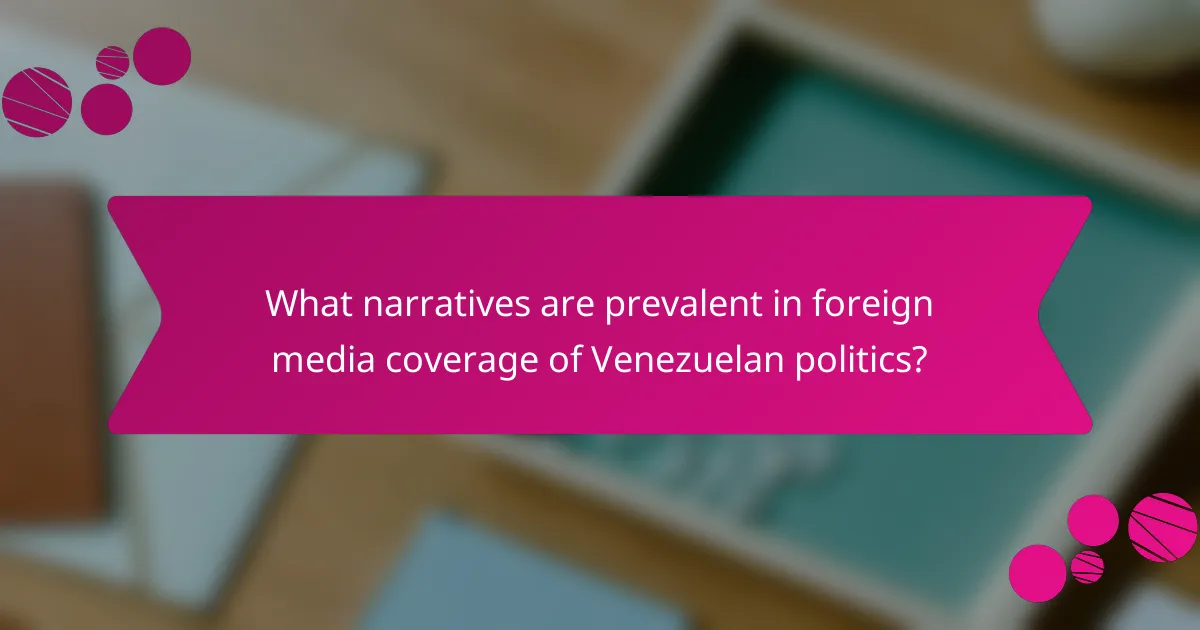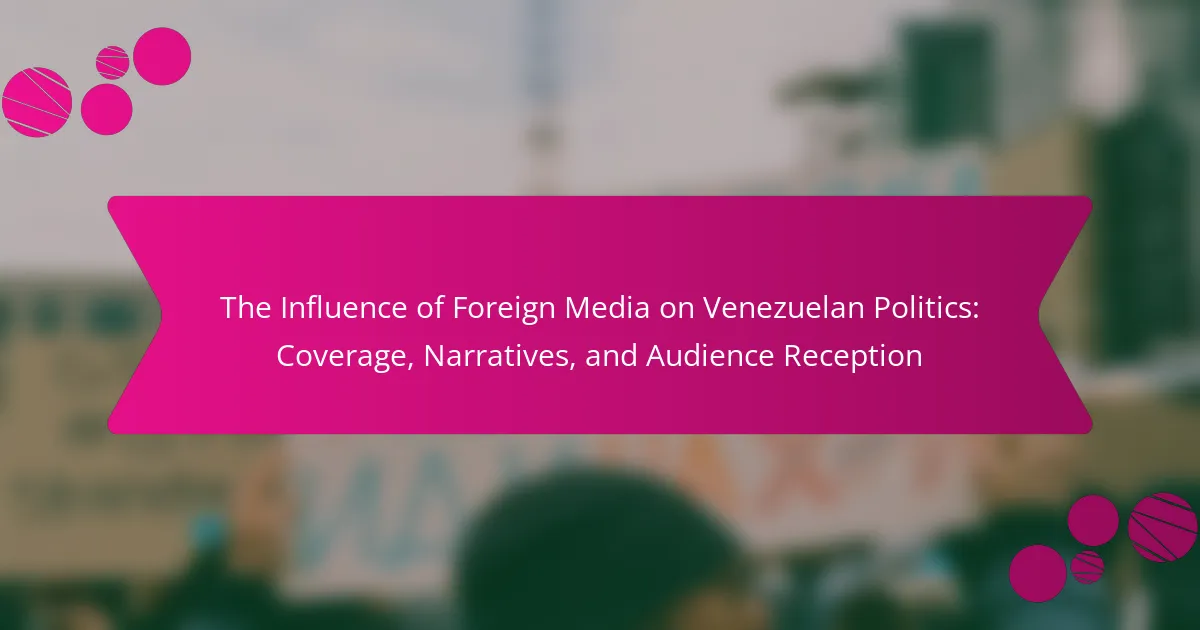
What is the Influence of Foreign Media on Venezuelan Politics?
Foreign media significantly influences Venezuelan politics by shaping public perception and political narratives. International news outlets provide coverage that often contrasts with state-controlled media. This coverage can affect the opinions of both domestic and international audiences. Reports from foreign media can highlight human rights abuses and economic crises. Such information may mobilize public opinion against the government. Additionally, foreign media can influence political discourse by framing issues in specific ways. For instance, the portrayal of protests can impact international diplomatic relations. Studies show that foreign media narratives often resonate with Venezuelans seeking alternative viewpoints. The influence of these narratives can lead to increased political activism and dissent.
How does foreign media coverage shape political narratives in Venezuela?
Foreign media coverage significantly shapes political narratives in Venezuela. It influences public perception and opinion through selective reporting. International outlets often highlight government repression and human rights abuses. This coverage can amplify opposition voices and mobilize support for change. For instance, reports during the 2019 protests showcased police violence against demonstrators. Such narratives can lead to increased international pressure on the Venezuelan government. Additionally, foreign media can frame the legitimacy of political leaders and elections. This framing affects how Venezuelans view their government and political options. Overall, foreign media serves as a critical lens through which Venezuelans understand their political landscape.
What are the primary sources of foreign media coverage in Venezuela?
The primary sources of foreign media coverage in Venezuela include international news agencies, foreign correspondents, and online platforms. International news agencies such as Reuters and Associated Press provide extensive reporting on Venezuelan events. Foreign correspondents stationed in Venezuela often deliver firsthand accounts and analysis. Additionally, online platforms like social media play a significant role in disseminating news and information about Venezuela. These sources contribute to a diverse narrative surrounding the political situation in the country. Their coverage often reflects various perspectives, influencing public perception both domestically and internationally.
How do different foreign media outlets portray Venezuelan politics?
Different foreign media outlets portray Venezuelan politics through varied narratives. Outlets like CNN and BBC often emphasize the humanitarian crisis and economic collapse. They report on the political repression and human rights abuses under the Maduro government. In contrast, some Latin American media may focus on regional solidarity and anti-imperialist sentiments. They highlight the U.S. sanctions and their impact on the Venezuelan populace. Russian and Chinese media tend to present a more favorable view of the Maduro administration. They frame the government as a bulwark against Western intervention. Each portrayal reflects the political leanings and interests of the respective media outlets. This diversity in coverage influences global perceptions of Venezuelan politics.
Why is foreign media influence significant in the context of Venezuelan politics?
Foreign media influence is significant in Venezuelan politics because it shapes public perception and political narratives. This influence impacts how both domestic and international audiences view the Venezuelan government. For instance, foreign media often highlight human rights abuses and economic crises, affecting global opinion. Reports from outlets like BBC and CNN can lead to international sanctions or interventions. Additionally, foreign media provide alternative viewpoints that may challenge state-controlled narratives. The Venezuelan government frequently accuses foreign media of bias, indicating their perceived threat. This ongoing dynamic influences political discourse within the country.
What historical events have heightened the role of foreign media in Venezuela?
The role of foreign media in Venezuela has been heightened by several historical events. The 2002 coup attempt against President Hugo Chávez drew significant international media attention. This event showcased the power struggle within Venezuela and the role of media narratives. The media’s portrayal influenced public perception both domestically and abroad.
The 2014 protests against the government also increased foreign media coverage. These protests highlighted social and economic issues, prompting international interest. The ongoing humanitarian crisis has further amplified the role of foreign media. Reports on shortages of food and medicine have drawn global concern.
Additionally, the 2018 presidential elections faced accusations of fraud, leading to increased scrutiny from international outlets. The political instability and economic collapse have made Venezuela a focal point for foreign journalists. These events collectively underscore the importance of foreign media in shaping narratives about Venezuela.
How does the Venezuelan government’s response impact foreign media narratives?
The Venezuelan government’s response shapes foreign media narratives by controlling information and framing events. The government often restricts access to independent journalists and media outlets. This leads to a reliance on state-sponsored narratives in international reporting. Consequently, foreign media may portray a biased view of the political situation. The government’s use of disinformation campaigns further complicates accurate reporting. Such tactics can discredit foreign media and influence public perception abroad. As a result, narratives may reflect the government’s agenda rather than objective reality. This dynamic creates a challenging environment for accurate foreign coverage of Venezuela.

What narratives are prevalent in foreign media coverage of Venezuelan politics?
Foreign media coverage of Venezuelan politics often emphasizes themes of authoritarianism and humanitarian crisis. Reports frequently depict the government as repressive, focusing on human rights violations and political imprisonment. Additionally, narratives highlight economic collapse and widespread poverty, illustrating the dire living conditions faced by citizens. Coverage often contrasts the current regime with past democratic governance. Reports also discuss international sanctions and their impact on the Venezuelan economy. The portrayal of opposition figures as heroes fighting against tyranny is common. Furthermore, foreign media often question the legitimacy of elections, citing irregularities and lack of transparency. These narratives shape global perceptions of Venezuela’s political landscape.
How do foreign media narratives differ from domestic perspectives?
Foreign media narratives often present a different perspective compared to domestic viewpoints. These narratives may emphasize issues that align with international interests or ideologies. For example, foreign media might focus on human rights violations in Venezuela, highlighting political repression. In contrast, domestic media may downplay these issues or frame them within a nationalistic context.
Additionally, foreign narratives can include a broader geopolitical analysis, linking Venezuela’s situation to regional stability. Domestic perspectives, however, might prioritize local political dynamics and socio-economic conditions. Research indicates that foreign media often have access to diverse sources, allowing for a more varied representation of events. Domestic media may be influenced by government regulations or biases, affecting their coverage.
This divergence in narratives shapes public perception and can influence political discourse within Venezuela.
What themes are commonly highlighted in foreign narratives about Venezuela?
Common themes in foreign narratives about Venezuela include political crisis, economic collapse, and humanitarian issues. Foreign media frequently emphasize the ongoing political turmoil, highlighting government repression and opposition struggles. Economic collapse is often portrayed through statistics showing hyperinflation and unemployment rates. Humanitarian issues are underscored by reports on food shortages and mass migration. Additionally, narratives frequently address international relations, particularly the influence of foreign powers like the United States and Russia. Reports often cite the humanitarian crisis affecting millions, with estimates indicating over five million Venezuelans have fled the country since 2014.
How do these narratives influence public opinion both domestically and internationally?
Narratives in foreign media significantly shape public opinion in Venezuela and abroad. Domestically, these narratives can create a perception of legitimacy or illegitimacy regarding the government. For example, coverage that highlights human rights abuses can galvanize local opposition. Internationally, these narratives influence diplomatic relations and foreign policy. Positive portrayals may encourage support from other nations, while negative depictions can lead to sanctions or isolation. Research shows that media framing affects public perception, as evidenced by studies linking coverage to shifts in public sentiment. Thus, narratives play a crucial role in shaping both domestic and international views on Venezuelan politics.
What role does bias play in foreign media coverage of Venezuelan politics?
Bias significantly influences foreign media coverage of Venezuelan politics. It shapes narratives and affects public perception. Different media outlets may emphasize specific events or perspectives. For example, some may focus on government failures, while others highlight opposition issues. This selective reporting can create a skewed understanding of the situation. Studies show that media bias can lead to polarized views among international audiences. Audience reception is often shaped by these biases, affecting how Venezuelan politics is perceived globally. Thus, bias plays a critical role in framing the political landscape in Venezuela.
How can bias in reporting affect the perception of Venezuelan political events?
Bias in reporting can significantly distort the perception of Venezuelan political events. When media outlets present information with a particular slant, it shapes public understanding. For example, selective coverage may highlight government failures while downplaying opposition actions. This creates an imbalanced narrative that influences audience opinions. Additionally, biased language can evoke emotional responses, further swaying perceptions. Research indicates that audiences often trust media sources that align with their beliefs. Consequently, this reinforces existing biases and divides public opinion. In Venezuela, where political polarization is high, such reporting can exacerbate tensions. Therefore, the impact of bias in reporting is profound and far-reaching.
What examples illustrate biased narratives in foreign media coverage?
Foreign media coverage of Venezuela often illustrates biased narratives through selective reporting and framing. For instance, many outlets emphasize the humanitarian crisis while downplaying government achievements. Coverage frequently depicts opposition leaders as heroes without addressing their controversial actions. Additionally, some reports focus on U.S. sanctions as the primary cause of economic decline, neglecting other factors like mismanagement.
In 2019, major news networks highlighted protests against President Maduro but often omitted the context of economic sabotage. Reports on violence in Venezuela sometimes fail to differentiate between government forces and criminal gangs, creating a misleading narrative. Furthermore, foreign media often portrays the country as a failed state, ignoring successful social programs that have improved literacy and healthcare. These examples demonstrate how biased narratives can shape perceptions of Venezuelan politics.

How do Venezuelan audiences receive and interpret foreign media coverage?
Venezuelan audiences receive and interpret foreign media coverage through a critical lens. They often compare foreign reports with local narratives. This comparison is influenced by their experiences with state-controlled media. Audiences may perceive foreign media as more credible due to the lack of bias. However, skepticism arises from the portrayal of Venezuela in international news. Many Venezuelans interpret coverage based on personal and collective experiences. The context of political and economic crises shapes their reception. Research indicates that audiences engage with foreign media selectively. They prioritize content that aligns with their beliefs and experiences.
What factors influence audience reception of foreign media in Venezuela?
Audience reception of foreign media in Venezuela is influenced by several key factors. Political context plays a significant role. The Venezuelan government often regulates media access and promotes state-sponsored narratives. This creates a challenging environment for foreign media. Cultural familiarity also affects reception. Audiences may prefer content that resonates with local values and experiences. Economic conditions impact media consumption as well. Limited access to technology can restrict viewership of foreign media outlets. Additionally, language barriers may hinder understanding of content. Trust in media sources is crucial; skepticism towards foreign narratives can shape audience perceptions. Finally, social media platforms serve as alternative sources of information, influencing how audiences engage with foreign media.
How do socio-economic conditions affect media consumption habits?
Socio-economic conditions significantly influence media consumption habits. Individuals with higher income levels tend to access a wider variety of media platforms. They have more disposable income for subscriptions and premium content. Conversely, lower-income individuals may rely on free or low-cost media options. Access to technology also varies with socio-economic status. Wealthier individuals often own multiple devices, enhancing media consumption. In contrast, those in lower socio-economic brackets may have limited access to reliable internet or devices. Studies indicate that socio-economic factors shape preferences for news sources and types of content consumed. For instance, lower-income groups may prefer local news that addresses their immediate concerns. Thus, socio-economic conditions directly correlate with the diversity and quality of media consumption.
What role does digital access play in shaping audience reception?
Digital access significantly influences audience reception by determining the availability and consumption of media content. Audiences with high digital access can easily access diverse foreign media sources. This exposure allows them to encounter various narratives and perspectives. Research indicates that increased digital access correlates with greater engagement in political discourse. For instance, a study by Pew Research Center shows that 72% of Venezuelans with internet access engage with news online. This interaction shapes their understanding of political events and influences their opinions. Thus, digital access is crucial in shaping how audiences receive and interpret media narratives.
How does audience reception impact political engagement in Venezuela?
Audience reception significantly impacts political engagement in Venezuela. Positive reception of foreign media narratives can mobilize citizens to participate in political activities. Conversely, negative reception may lead to apathy or resistance against political initiatives. Studies show that Venezuelans increasingly turn to foreign media for information due to local media restrictions. This reliance can shape public opinion and influence political discourse. For instance, favorable coverage of opposition movements can enhance their visibility and support. Additionally, audience engagement with these narratives may lead to increased activism and protests. Thus, the way audiences receive and interpret information directly affects their political involvement.
What are the observable effects of foreign media narratives on political activism?
Foreign media narratives significantly influence political activism in Venezuela. They shape public perception and mobilize citizens. For example, coverage of protests can amplify their visibility. This visibility encourages more individuals to participate. Foreign narratives often frame local issues in a global context. This framing can legitimize local movements. Research shows that narratives from international outlets can increase social media engagement. Increased engagement often translates into higher participation rates in protests.
How do Venezuelans differentiate between credible and non-credible foreign media sources?
Venezuelans differentiate between credible and non-credible foreign media sources by evaluating several key factors. They assess the reputation of the media outlet. Established organizations with a history of reliable reporting are often deemed credible. They also consider the presence of fact-checking and transparency in the reporting process. Sources that provide clear citations and evidence for their claims are favored. Furthermore, Venezuelans analyze the consistency of the information across multiple outlets. If various credible sources report similar facts, the information is likely considered trustworthy. Social media influence also plays a role, as audiences may rely on peer recommendations. Research indicates that Venezuelans are increasingly discerning about media consumption, reflecting a desire for accurate information amidst political turmoil.
What are the best practices for critically engaging with foreign media coverage?
To critically engage with foreign media coverage, one should evaluate the source’s credibility. Assess the outlet’s reputation and its history of accuracy. Analyzing the language used in the coverage is essential. Look for bias or emotionally charged words that may influence perception. Comparing multiple sources provides a broader perspective. It helps identify discrepancies and common themes. Understanding the context of the coverage is crucial. Consider the political, cultural, and historical background of the reporting. Engaging with local voices can offer insights often overlooked by foreign media. This practice enhances understanding of the nuanced situation.
The main entity of this article is the influence of foreign media on Venezuelan politics. The article examines how foreign media coverage shapes political narratives, public perception, and audience reception in Venezuela. It highlights the role of various international news outlets, the portrayal of political events, and the impact of socio-economic conditions on media consumption. Additionally, the article discusses the historical context that has heightened foreign media’s role, the significance of bias in reporting, and how Venezuelans differentiate between credible and non-credible sources. Overall, the article provides a comprehensive analysis of the interplay between foreign media narratives and political activism in Venezuela.
